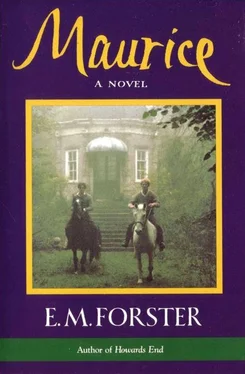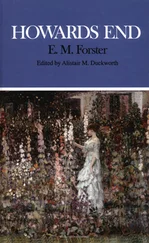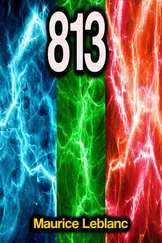"Cut them all — he'll only gate you."
"Will you come out in the side-car?"
"Yes, but a long way," said Clive, lighting a cigarette. "I can't stick Cambridge in this weather. Let's get right outside it ever so far and bathe. I can work as we go along — Oh damnation!" — for there were steps on the stairs. Joey Fetherstonhaugh looked in and asked one or other of them to play tennis with him that afternoon. Maurice accepted.
"Maurice! What did you do that for, you fool?"
"Cleared him out quickest. Clive, meet me at the garage in twenty minutes, bring your putrid books, and borrow Joey's goggles. I must dress. Bring some lunch too."
"What about horses instead?"
"Too slow."
They met as arranged. Joey's goggles had offered no difficulty, as he had been out. But as they threaded Jesus Lane they were hailed by the Dean.
"Hall, haven't you a lecture?"
"I overslept," called Maurice contemptuously.
"Hall! Hall! Stop when I speak."
Maurice went on. "No good arguing," he observed.
"Not the least."
They swirled across the bridge and into the Ely road. Maurice said, "Now we'll go to Hell." The machine was powerful, he reckless naturally. It leapt forward into the fens and the receding dome of die sky. They became a cloud of dust, a stench, and a roar to the world, but the air they breathed was pure, and all the noise they heard was the long drawn cheer of the wind. They cared for no one, they were outside humanity, and death, had it come, would only have continued their pursuit of a retreating horizon. A tower, a town — it had been Ely — were behind them, in front the same sky, paling at last as though heralding the sea. "Right turn," again, then "left," "right," until all sense of direction was gone. There was a rip, a grate. Maurice took no notice. A noise arose as of a thousand pebbles being shaken together between his legs. No accident occurred, but the machine came to a standstill among the dark black fields. The song of the lark was heard, the trail of dust began to settle behind them. They were alone.
"Let's eat," said Clive.
They ate on a grassy embankment. Above them the waters of a dyke moved imperceptibly, and reflected interminable willow trees. Man, who had created the whole landscape, was nowhere to be seen. After lunch Clive thought he ought to work. He spread out his books and was asleep in ten minutes. Maurice lay up by the water, smoking. A farmer's cart appeared, and it did occur to him to ask which county they were in. But he said nothing, nor did the farmer appear to notice him. When Clive awoke it was past three. "We shall want some tea soon," was his contribution.
"All right. Can you mend that bloody bike?"
"Oh yes, didn't something jam?" He yawned and walked down to the machine. "No, I can't, Maurice, can you?"
"Rather not."
They laid their cheeks together and began laughing. The smash struck them as extraordinarily funny. Grandpapa's present too! He had given it to Maurice against his coming of age in August. Clive said, "How if we left it and walked?"
"Yes, who'd do it any harm? Leave the coats and things inside it. Likewise Joey's goggles."
"What about my books?"
"Leave 'em too."
"I shan't want them after hall?"
"Oh, I don't know. Tea's more important than hall. It stands to reason — well what are you giggling at? — that if we follow a dyke long enough we must come to a pub."
"Why, they use it to water their beer!"
Maurice smote him on the ribs, and for ten minutes they played up amongst the trees, too silly for speech. Pensive again, they stood close together, then hid the bicycle behind dog roses, and started. Clive took his notebook away with him, but it did not survive in any useful form, for the dyke they were following branched.
"We must wade this," he said. "We can't go round or we shall never get anywhere. Maurice, look — we must keep in a bee line south."
"All right."
It did not matter which of them suggested what that day; the other always agreed. Clive took off his shoes and socks and rolled his trousers up. Then he stepped upon the brown surface of the dyke and vanished. He reappeared swimming.
"All that deep!" he spluttered, climbing out. "Maurice, no idea! Had you?"
Maurice cried, "I say, I must bathe properly." He did so, while Clive carried his clothes. The light grew radiant. Presently they came to a farm.
The farmer's wife was inhospitable and ungracious, but they spoke of her afterwards as "absolutely ripping." She did in the end give them tea and allow Clive to dry near her kitchen fire. She "left payment to them," and, when they overpaid her, grumbled. Nothing checked their spirits. They transmuted everything.
"Goodbye, we're greatly obliged," said Clive. "And if any of your men come across the bike: I wish we could describe where we left it better. Anyhow I'll give you my friend's card. Tie it on the bike if they will be so kind, and bring it down to the nearest station. Something of the sort, I don't know. The station master will wire to us."
The station was five miles on. When they reached it the sun was low, and they were not back in Cambridge till after hall. All this last part of the day was perfect. The train, for some unknown reason, was full, and they sat close together, talking quietly under the hubbub, and smiling. When they parted it was in the ordinary way: neither had an impulse to say anything special. The whole day had been ordinary. Yet it had never come before to either of them, nor was it to be repeated.
14
The Dean sent Maurice down. Mr Cornwallis was not a severe official, and the boy had a tolerable record, but he could not overlook so gross a breach of discipline. "And why did you not stop when I called you, Hall?" Hall made no answer, did not even look sorry. He had a smouldering eye, and Mr Cornwallis, though much annoyed, realized that he was confronted with a man. In a dead, bloodless way, he even guessed what had happened.
"Yesterday you cut chapel, four lectures, including my own translation class, and hall. You have done this sort of thing before. It's unnecessary to add impertinence, don't you think? Well? No reply? You will go down and inform your mother of the reason. I shall inform her too. Until you write me a letter of apology, I shall not recommend your readmission to the college in October. Catch the twelve o'clock."
"All right."
Mr Cornwallis motioned him out.
No punishment was inflicted on Durham. He had been let off all lectures in view of his Tripos, and even if he had been remiss the Dean would not have worried him; the best classical scholar of his year, he had won special treatment. A good thing he would no longer be distracted by Hall. Mr Cornwallis always suspected such friendships. It was not natural that men of different characters and tastes should be intimate, and although undergraduates, unlike schoolboys, are officially normal, the dons exercised a certain amount of watchfulness, and felt it right to spoil a love affair when they could.
Clive helped him pack, and saw him off. He said little, lest he depressed his friend, who was still in the heroics, but his heart sank. It was his last term, for his mother would not let him stay up a fourth year, which meant that he and Maurice would never meet in Cambridge again. Their love belonged to it, and particularly to their rooms, so that he could not conceive of their meeting anywhere else. He wished that Maurice had not taken up a strong line with the Dean, but it was too late now, and that the side-car had not been lost. He connected that side-car with intensities — the agony of the tennis court, the joy of yesterday. Bound in a single motion, they seemed there closer to one another than elsewhere; the machine took on a life of its own, in which they met and realized the unity preached by Plato. It had gone, and when Maurice's train went also, actually tearing hand from hand, he broke down, and returning to his room wrote passionate sheets of despair.
Читать дальше












